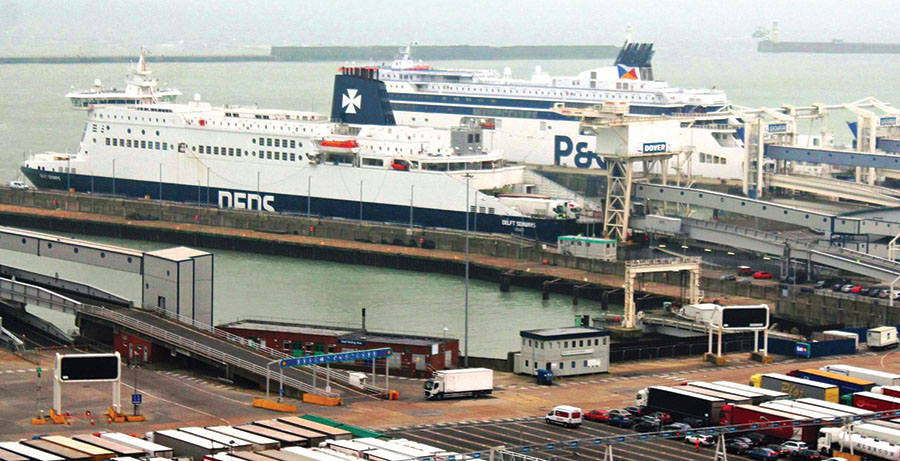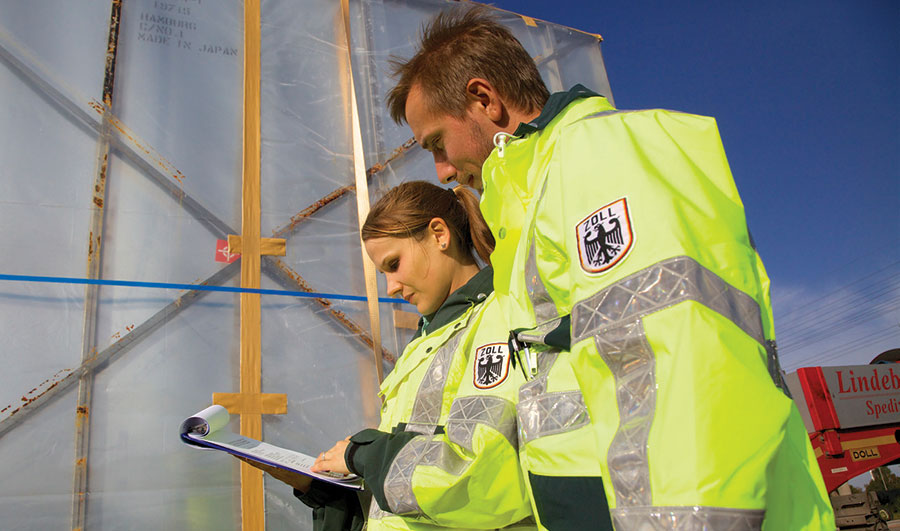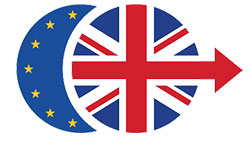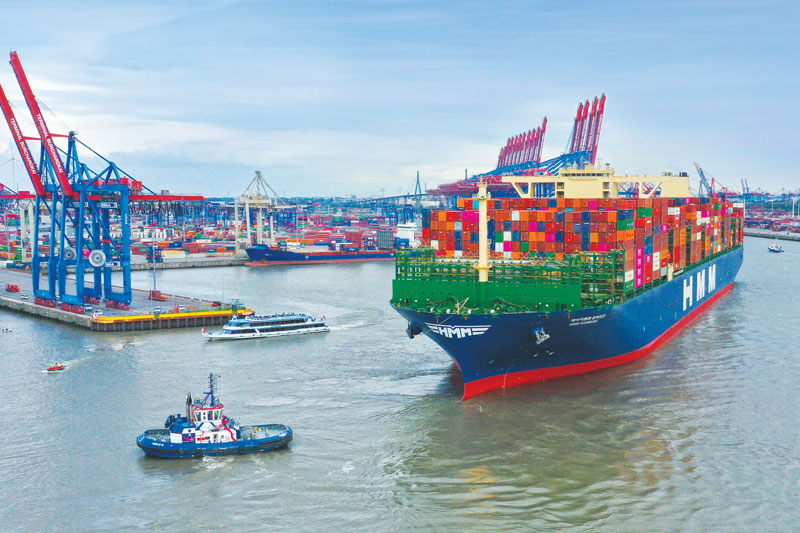BREXIT: The long and winding road
Even months after Brexit, there’s still much that needs to be clarified. In the meantime, some businesses and politicians are already calling for further negotiations. We take a look at the impact on manufacturers, retailers, and transport and logistics service providers.
Empty supermarket shelves in Northern Ireland; parcel shippers who’ve temporarily stopped their deliveries from Great Britain (GB) to the European Continent and Ireland; Customs problems for textile traders and their products made in Asia; and seafood exporters who can’t deliver their perishable goods in time due to new complex declarations.
These were just a few of the headlines that dominated the media for many weeks after Britain left the European Union (EU).
Northern Ireland is particularly hard hit. With Brexit, Northern Ireland, which is part of the United Kingdom, has become subject to special regulations that are set out in the so-called Northern Ireland (NI) Protocol. This avoids a hard EU external border between the Republic of Ireland and Northern Ireland, as it’s feared that old political conflicts could flare up again.

Cross Channel ferry services between Dover and mainland Europe.
Northern Ireland is thus more closely tied to the EU and continues to follow the rules of the EU internal market. Consequently, since January 1, 2021, Customs and certificate controls have been required when shipping goods from Great Britain to Northern Ireland.
During a recent roundtable with representatives of the EU and the U.K. government this February, Seamus Leheny, policy manager for Northern Ireland at the leading trade association Logistics U.K., raised the concerns of the sector regarding the implementation of the NI Protocol. “Several formalities under the Northern Ireland Protocol are causing difficulties to logistics businesses,” he said. “We need the right processes in place if the protocol is to be successful in supporting trade flows.”
According to Leheny, Logistics U.K. laid out three key conditions. First, the group wants to see the development of a “retail movement scheme” to govern the transportation of agri-food goods, plants, and animals between GB and Northern Ireland. The checks on these items—known as sanitary and phytosanitary (SPS) checks—must be proportionate to the low risk that these items present to health to prevent any unnecessary administration and delays.
Second, industry needs to see the introduction of a Trusted Trader status for parcel operators to reduce expensive administrative burdens placed on business to consumer consignments. And finally, “to enable the successful delivery of these schemes, the grace periods currently in place under the NI Protocol must be extended sufficiently to enable longer term simplifications to be agreed and implemented,” said Leheny.
Some of the transition rules expire at the end of March. Thus, the U.K. government has called for an extension to 2023. As London and the EU Commission have not agreed on an extension, further roundtable meetings are planned.
“Both the U.K. and EU government representatives expressed their commitment to reaching pragmatic solutions, and I look forward to meeting again on a quarterly basis to ensure that the NI Protocol is best serving the business community,” added Leheny.

Mobile customs control in the Port of Hamburg
Higher prices and shrinking imports
There are also great concerns in the Republic of Ireland. Even weeks after the introduction of border controls on U.K. imports, haulers and importers in Ireland are struggling to deal with the Customs regulations and border checks on goods coming into the Republic from Britain.
Paul Kelly, director of Food Drink Ireland (FDI), the main trade association for the food and beverage industry, explained: “The Irish food and drink sector is by far the most exposed of any sector in any country in Europe to Brexit. Even with an EU-U.K. deal, we now face additional paperwork, customs and SPS formalities, transport delays and disruption to delivery schedules.”
Kelly also stressed that these changes are imposing additional costs on businesses. According to FDI, there are tariffs between 8% and 30% on yogurt, drinks, snacks and other food items routed to the Irish market through the U.K., which puts pressure on manufacturers to absorb the additional costs and leads to higher food prices for Irish consumers.
Complaints regarding import fees are also coming from online shoppers in Ireland, who often use British sites to fulfil their orders. Since January 1, 2021, the British Amazon site has imposed steep import fees to cover border taxes, customs duties, and fees on some items levied in the country of importation, while consumers in Northern Ireland are seeing the selection of goods shrink as the Amazon site de-lists products due to Brexit customs rules.
Therefore, more Irish customers are shifting to Amazon’s sites in the EU markets to avoid fees and disruption.
According to Glenn Carr, general manager of Rosslare Europort in South Eastern Ireland, “there are first signs of shifts in routing goods, as major retailers in Ireland are now shipping their products directly from mainland Europe to Ireland, he says. “Among them, are big customers such as Amazon bringing in a lot of freight on a daily basis.”
New gateway to Europe
After Brexit, haulers are also seeking new routes between Ireland and the EU to avoid the U.K. landbridge, which now involves additional Customs, checks and delays. Rosslare Europort, Ireland’s leading port for direct RoPax sailings to mainland Europe with 30 trips per week, has become a new gateway to the continent.
Irish traders have been turning to shipping goods directly to European ports since the Brexit transition period ended. Because they often use ferry services between Rosslare and the French ports Dunkirk and Cherbourg, the Irish port has seen an increase in traffic. Ferry services running out of Rosslare Europort increased by 45% in freight traffic during January compared to the same period last year.
In the meantime, U.K. traffic is down by 49% for the month of January, but European freight is up by 446% year-on-year. Rosslare Europort responded to the increased demand and introduced new services by Brittany Ferries between Rosslare and Saint Malo in France and Bilbao in Spain in January and February of this year.
Ports looking ahead
Long lines of trucks at the borders and in the ports that link Great Britain and mainland Europe shaped the picture between Christmas and the turn of the year.
At the beginning of February, the Port of Dover, the cross-channel hub and the nearest port to France, announced that the number of trucks travelling to Europe via Dover was back up to over 90% of the equivalent 2020 volume. The port handles up to £122 billion ($169 billion), or 17% of the U.K.’s trade in goods.

Roughly 9,000 trucks pass through the port of Dover every day.
“I’m really encouraged to see such a positive start to the New Year as we adapt to the new systems and processes involved in a new, post-Brexit transition era,” says Sarah West, the Port of Dover’s chief operations officer.
After the UK has left the EU, the development of free ports is a topic on the agenda of Prime Minister Boris Johnson and his government. According to Brexit supporters, leaving the EU offers greater flexibility to set up low-tax economic areas, as the U.K. no longer has to follow EU rules.
At this time, there are plans for seven freeports in England and one each in Wales, Scotland, and Northern Ireland. More than 30 ports and airports across the U.K. were bidding for the 10 freeport areas, and the winners will probably be announced by late spring.
European ports have also been well prepared for Brexit as well as the transition period and are looking ahead. According to Port of Rotterdam’s spokesman Leon Willems, it’s still difficult to estimate how turnover with the U.K. will develop this year.
According to Willems, before Brexit, the total Anglo-Dutch trade volume was approximately 54 million tons a year, 80% of which was going through Port of Rotterdam, which was about 40 million tons or 8.5% of our total throughput. “We’re almost two months into the new year,” he says, “and given that short period of time, and given that the supply chain is adapting to the new realities like Customs formalities, it’s a bit too early to say what the volume effect of Brexit is going to be.”
Stockpiles that were made in November and December of last year, adds Willems, will need beefing up at some point in the near future. “So, after initial decreases in volume in January, we expect cargo volumes to go up—by how much is difficult to say at this point,” he says.
The Port of Hamburg, Germany’s largest universal port, sees a positive trend in trade with the U.K. In fact, container shipping for the U.K. reached a new record of 266,000 TEU in 2020, up 28% year-on-year. “This positive development is mainly based on an upturn in shipments for the German market and increased deliveries to the U.K. pre-Brexit,” says Ingo Egloff, CEO of Port of Hamburg Marketing. “In order to avoid congestion in the ferry ports on the channel, shippers have increasingly routed their export or import goods to and from the U.K. by sea via Hamburg.”
Don’t forget new pallet regulations
With Brexit, the regulations for wooden pallets to and from Great Britain also changed on January 1, 2021. Because the country no longer belongs to the EU internal market, wooden pallets have to be checked for conformity to the ISPM 15 standard at all borders of the U.K.
Many hurdles to overcome after Brexit
 Days before a “hard” Brexit loomed at the close of 2020, negotiators sealed the EU/UK Trade and Cooperation Agreement (TCA) to limit disruptions and govern future relations. These are now two separate markets, with separate legal and regulatory frameworks.
Days before a “hard” Brexit loomed at the close of 2020, negotiators sealed the EU/UK Trade and Cooperation Agreement (TCA) to limit disruptions and govern future relations. These are now two separate markets, with separate legal and regulatory frameworks.
Brexit officially ended the free movement of persons, goods and services, but the Agreement provides for free trade and cooperation on economic, social and other issues. It stipulates zero tariffs and quotas on all goods produced in the respective region, but trade with non-EU or non-U.K. products is subject to duty. Value-added taxes apply to imports.
Brexit means the formalities have changed because Customs documentation and clearance are required and conformity to product and environmental standards must be checked. Goods require proof of domestic production for duty-free status, but there is a grace period on this “rules of origin” paperwork until January 2022.
Some merchandise, including cars, chemicals and pharmaceuticals, enjoys simplified processes, as do wine and organic products. Britain must maintain previous EU standards in the future, to guarantee equal competition.
The border between Ireland and Northern Ireland is now one between the EU and the U.K., but it’s politically important that it remain open. Free movement was crucial to the “Good Friday Agreement” that ended the bloody Northern Ireland conflict. The Northern Ireland-Protocol maintains freedom of movement for people and goods post Brexit.
Accordingly, Northern Ireland effectively remains part of the EU single market, although legally within the British customs realm. Thus, British goods coming to Northern Ireland are subject to checks, which has caused bottlenecks and shortages. While the country was granted time to adapt, many businesses and transport companies are struggling.
Political tension has been growing, with the pro-British Northern Irish unionists angry about trade restrictions on the “Irish Sea border” and the EU blaming Brexit and the U.K. for the problems. In February, the leader of the unionist DUP party launched action challenging the Northern Ireland-Protocol. However, the nationalists, the EU, and President Biden have all stressed that the border between the Republic and Northern Ireland must remain open.
This could lead to serious delays in the transport of goods, warns the German Association for Wood Packaging, Pallets and Export Packaging (HPE). “It is estimated that not even half of all pallets that are on the move between England and Europe meet the ISPM requirements,” says HPE managing director Marcus Kirschner.
The ISPM 15 standard applies to wooden pallets intended for export to and import from non-EU countries. The regulations stipulate that wooden packaging and transport materials in cross-border traffic must be heat treated against possible pests. This does not apply within the EU. In the event of non-compliance, the pallets and the goods will be returned—or they have to be treated at the sender’s expense.
Break bulk solution for parcel?
Even though the EU/U.K. agreement provides for free trade, Brexit does mean that there’s a border between the regions, requiring Customs clearance and considerable paperwork regarding conformity issues for cross-border trade. One way to reduce costs is to consolidate multiple orders into one big shipment to cross the border, thus reducing shipping charges and paperwork.
Chicago-based Logistyx Technologies, which provides transportation management for parcel shipping worldwide, has seen a 250% increase in customers using or close to implementing breakbulk services to cut Brexit-related shipping costs and paperwork. The company says that customers can achieve savings of more than 25% on their transportation costs by switching from individual shipments to a breakbulk service.
Furthermore, with just one set of paperwork per consolidated shipment, problems and delays at the borders can be reduced. “Although breakbulk services have existed for some time, we have seen a huge upswing in interest over the last two to three years,” says Ken Fleming, president of Logistyx. “This move is not just to achieve cost savings, which help to offset newly introduced Customs duties and taxes resulting from Brexit, but to simplify Customs documentation, as there is just one set of paperwork to be processed.”
Long process ahead
With the referendum in June 2016, the U.K. began the process of leaving the EU, which after a long period of political strife, officially occurred on January 31, 2020. At the end of 2020, the transition period also ended, and a new phase began, in which EU/U.K. relations are now governed by the trade agreement signed in December.
What the long-term impact on the British, European, and world economies will be remains to be seen. Many political issues are still contentious, both within the U.K. and the EU, and the logistics and transport industry is coping with some obstacles and discovering new potentials.
While many of the changes affect the former partners most, anyone doing business with them will need to adapt, particularly international firms that previously used Britain as a gateway to Europe.

Article Topics
Global Trade News & Resources
Supply Chain Stability Index sees ‘Tremendous Improvement’ in 2023 Descartes March Global Shipping Report highlights ongoing steady volume momentum U.S.-bound import growth track remains promising, notes Port Tracker report EU Update 2024: Crises lead to growth Examining the impact of the Taiwan earthquake on global supply chain operations Descartes announces acquisition of OCR Services Inc. Industry experts examine the impact of Baltimore bridge collapse on supply chains More Global TradeLatest in Logistics
LM Podcast Series: Assessing the freight transportation and logistics markets with Tom Nightingale, AFS Logistics Investor expectations continue to influence supply chain decision-making The Next Big Steps in Supply Chain Digitalization Warehouse/DC Automation & Technology: Time to gain a competitive advantage The Ultimate WMS Checklist: Find the Perfect Fit Under-21 driver pilot program a bust with fleets as FMCSA seeks changes Diesel back over $4 a gallon; Mideast tensions, other worries cited More LogisticsSubscribe to Logistics Management Magazine

Find out what the world's most innovative companies are doing to improve productivity in their plants and distribution centers.
Start your FREE subscription today.
April 2023 Logistics Management

Latest Resources
















